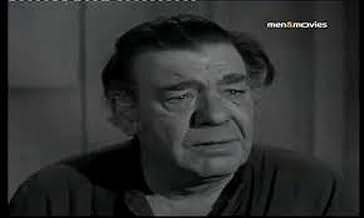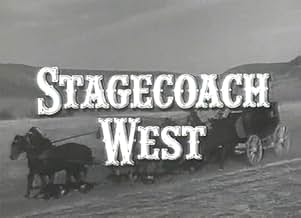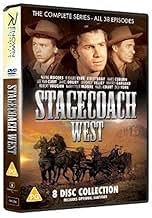Agrega una trama en tu idiomaLuke Perry and Simon Kane, accompanied by Simon's young son David, run a stagecoach line in the Old West, where they come across a wide variety of ladies in distress, killers, and robbers.Luke Perry and Simon Kane, accompanied by Simon's young son David, run a stagecoach line in the Old West, where they come across a wide variety of ladies in distress, killers, and robbers.Luke Perry and Simon Kane, accompanied by Simon's young son David, run a stagecoach line in the Old West, where they come across a wide variety of ladies in distress, killers, and robbers.
Explorar episodios
Opiniones destacadas
Just following this series on Talking Pictures. I did catch it as a child back in the sixties, but only tended to watch it when there was nothing else on. This happened quite a lot in those days since we only had a choice of two TV channels. My main recollection is being rather bored by the episodes featuring Simon and Davey, which always seemed to be so self-righteous, or rather like child development advice. Davey would end the episode having learned a valuable lesson about growing up having observed the idiosyncracys of the guest star, who usually played the villain. Viewing the series now, I still feel the same about these episodes, but I have been struck by the amount of killing which goes on. Most episodes have two or three shootings and some have even more. Both Luke and Simon are trigger happy and I think that the jobs with the shortest life expectancy must be relay station manager or hired hand. The number of those who get murdered by passing bandits is unbelievable. That's apart from Zeke of course, who always manages to survive despite a high turnover of underlings. And, no-one ever seems unduly upset by the deaths. Following the murder and mayhem, just before the closing credits roll, the three main characters usually manage a jokey exchange or ironic comment. All that's missing is the laughing, muted trumpet (wah, wah, w-a-a-h!) Maybe they cancelled the series because they'd run out of extras!
"Stagecoach West" was in no way similar to "Wagon Train". Probably the closest thing to it would have been the very short-lived "Overland Trail" which came and went before "Stagecoach West" premiered in the fall of 1960. (The other show was a mid-season replacement that ran from Feb-June 1960.
Both shows featured an older driver and a younger, good-looking sidekick. (Overland Trail had William Bendix as the seasoned driver and Doug McClure as his sidekick; Stagecoach West had Robert Bray and Wayne Rogers respectively.)
The stagecoach provided the plot device to get them into a new location every week to look for trouble.
"Stagecoach West" benefitted from the fact that its two leads were far more believable in their roles than "Overland Trail"; after years of "Life of Riley", nobody bought William Bendix as a Western lead, and McClure's character was a goofy skirt chaser. Bray didn't have a signature role in a sitcom to live down, and Wayne Rogers a decade or so before HIS signature role as Trapper John played his sidekick part more seriously with a bit more grit. The addition of Richard Eyer as Bray's young son added another dimension to the action.
Sadly, both these shows were simply lost in the shuffle of far too many westerns that the TV studios were cranking out right and left. Proof indeed you CAN have too much of a good thing.
I've got no quarrel with the qualitative assessments here, but I do
have to clarify a couple of things. First of all, STAGECOACH WEST and
WAGON TRAIN had almost nothing in common, despite the presence of wagon
wheels on both shows. One (STAGECOACH) spotlighted single stories of
the heroes' interaction with one of the passengers on the stagecoach,
while the other featured multiple stories of the many occupants of the
wagons that made the cross-country journey. The stagecoach ride was
short and almost never shown in its entirety, while the days-long
journeys on WAGON TRAIN usually started and ended the episodes.
The other clarification is that, due to the series' structure (a 38-39 episode season, one-hour episodes), the length of production of each episode made it impractical to feature both Wayne Rogers and Robert Bray in every episode. (Again, this was another difference between the two; meantime, WAGON TRAIN solved this by having multiple leads--Ward Bond, Robert Horton, Robert Fuller--who often would share episodes.) Using the MAVERICK paradigm, most STAGECOACH WEST episodes just featured one or the other, with infrequent instances when both (not to mention Richard Eyer) were involved. The Rogers episodes involved him as more of a roving gunfighter-defender usually set in destination cities (more like WANTED: DEAD OR ALIVE), while the Bray episodes were more homespun (like THE RIFLEMAN), set around the town where the stagecoach line was based. In other words, the partners were not interchangeable, just as Bret and Bart (or Beau and Bart, or even Brent and Bart) were usually given stories playing to their strengths, so, in essence, you got two different series under an umbrella title, even more similar to the much later NAME OF THE GAME.
The marshal thing seems to come and go; I'm not sure if Luke and Simon were deputized in mid-series or not, but I've seen episodes in which it would have been natural for one or the other to flash a badge, and they did not. (The consequences of viewing them randomly...)
One other thing: while it's historically interesting to see Wayne Rogers more than a decade before M*A*S*H (and Bray several years prior to becoming Corey Stuart on LASSIE), what's more interesting is how little Rogers changed between his series. In fact, you can hear Trapper John Alabama-tinged line readings in almost every episode of STAGECOACH WEST, (quite unlike Alan Alda, whose acting changed quite a bit in the same decade prior to M*A*S*H; see his episode of BILKO, for example), just as you knew what you were getting when Rogers later portrayed Jake Axminster and Dr. Charley Michaels. And even in his eighties, Rogers looks like he could still play Luke Perry.
The other clarification is that, due to the series' structure (a 38-39 episode season, one-hour episodes), the length of production of each episode made it impractical to feature both Wayne Rogers and Robert Bray in every episode. (Again, this was another difference between the two; meantime, WAGON TRAIN solved this by having multiple leads--Ward Bond, Robert Horton, Robert Fuller--who often would share episodes.) Using the MAVERICK paradigm, most STAGECOACH WEST episodes just featured one or the other, with infrequent instances when both (not to mention Richard Eyer) were involved. The Rogers episodes involved him as more of a roving gunfighter-defender usually set in destination cities (more like WANTED: DEAD OR ALIVE), while the Bray episodes were more homespun (like THE RIFLEMAN), set around the town where the stagecoach line was based. In other words, the partners were not interchangeable, just as Bret and Bart (or Beau and Bart, or even Brent and Bart) were usually given stories playing to their strengths, so, in essence, you got two different series under an umbrella title, even more similar to the much later NAME OF THE GAME.
The marshal thing seems to come and go; I'm not sure if Luke and Simon were deputized in mid-series or not, but I've seen episodes in which it would have been natural for one or the other to flash a badge, and they did not. (The consequences of viewing them randomly...)
One other thing: while it's historically interesting to see Wayne Rogers more than a decade before M*A*S*H (and Bray several years prior to becoming Corey Stuart on LASSIE), what's more interesting is how little Rogers changed between his series. In fact, you can hear Trapper John Alabama-tinged line readings in almost every episode of STAGECOACH WEST, (quite unlike Alan Alda, whose acting changed quite a bit in the same decade prior to M*A*S*H; see his episode of BILKO, for example), just as you knew what you were getting when Rogers later portrayed Jake Axminster and Dr. Charley Michaels. And even in his eighties, Rogers looks like he could still play Luke Perry.
I only caught this series comparatively recently on a satellite channel. I don't know if it was ever originally shown in the UK but I'd have been very young if it was, although it's surprising the number of series I do remember! It's a pretty much forgotten gem, like the equally almost forgotten "Johnny Ringo". The stories are entertaining and well done, with an interesting range of guest stars popping up. It stands up well against much longer lasting more familiar series of the time.
It was certainly worthy of a longer run. Well worth seeking out on the less popular, lower rated satellite/cable channels, the only ones this day & age likely to show anything like this.
It was certainly worthy of a longer run. Well worth seeking out on the less popular, lower rated satellite/cable channels, the only ones this day & age likely to show anything like this.
I've got no quarrel with the qualitative assessments here, but I do have to clarify a couple of things. First of all, STAGECOACH WEST and WAGON TRAIN had almost nothing in common, despite the presence of wagon wheels on both shows. One (STAGECOACH) spotlighted single stories of the heroes' interaction with one of the passengers on the stagecoach, while the other featured multiple stories of the many occupants of the wagons that made the cross-country journey. The stagecoach ride was short and almost never shown in its entirety, while the days-long journeys on WAGON TRAIN usually started and ended the episodes.
The other clarification is that, due to the series' structure (a 38-39 episode season, one-hour episodes), the length of production of each episode made it impractical to feature both Wayne Rogers and Robert Bray in every episode. (Again, this was another difference between the two; meantime, WAGON TRAIN solved this by having multiple leads--Ward Bond, Robert Horton, Robert Fuller--who often would share episodes.) Using the MAVERICK paradigm, most STAGECOACH WEST episodes just featured one or the other, with infrequent instances when both (not to mention Richard Eyer) were involved. The Rogers episodes involved him as more of a roving gunfighter-defender usually set in destination cities (more like WANTED: DEAD OR ALIVE), while the Bray episodes were more homespun (like THE RIFLEMAN), set around the town where the stagecoach line was based. In other words, the partners were not interchangeable, just as Bret and Bart (or Beau and Bart, or even Brent and Bart) were usually given stories playing to their strengths, so, in essence, you got two different series under an umbrella title, even more similar to the much later NAME OF THE GAME.
The marshal thing seems to come and go; I'm not sure if Luke and Simon were deputized in mid-series or not, but I've seen episodes in which it would have been natural for one or the other to flash a badge, and they did not. (The consequences of viewing them randomly...)
One other thing: while it's historically interesting to see Wayne Rogers more than a decade before M*A*S*H (and Bray several years prior to becoming Corey Stuart on LASSIE), what's more interesting is how little Rogers changed between his series. In fact, you can hear Trapper John Alabama-tinged line readings in almost every episode of STAGECOACH WEST, (quite unlike Alan Alda, whose acting changed quite a bit in the same decade prior to M*A*S*H; see his episode of BILKO, for example), just as you knew what you were getting when Rogers later portrayed Jake Axminster and Dr. Charley Michaels. And even in his eighties, Rogers looks like he could still play Luke Perry.
The other clarification is that, due to the series' structure (a 38-39 episode season, one-hour episodes), the length of production of each episode made it impractical to feature both Wayne Rogers and Robert Bray in every episode. (Again, this was another difference between the two; meantime, WAGON TRAIN solved this by having multiple leads--Ward Bond, Robert Horton, Robert Fuller--who often would share episodes.) Using the MAVERICK paradigm, most STAGECOACH WEST episodes just featured one or the other, with infrequent instances when both (not to mention Richard Eyer) were involved. The Rogers episodes involved him as more of a roving gunfighter-defender usually set in destination cities (more like WANTED: DEAD OR ALIVE), while the Bray episodes were more homespun (like THE RIFLEMAN), set around the town where the stagecoach line was based. In other words, the partners were not interchangeable, just as Bret and Bart (or Beau and Bart, or even Brent and Bart) were usually given stories playing to their strengths, so, in essence, you got two different series under an umbrella title, even more similar to the much later NAME OF THE GAME.
The marshal thing seems to come and go; I'm not sure if Luke and Simon were deputized in mid-series or not, but I've seen episodes in which it would have been natural for one or the other to flash a badge, and they did not. (The consequences of viewing them randomly...)
One other thing: while it's historically interesting to see Wayne Rogers more than a decade before M*A*S*H (and Bray several years prior to becoming Corey Stuart on LASSIE), what's more interesting is how little Rogers changed between his series. In fact, you can hear Trapper John Alabama-tinged line readings in almost every episode of STAGECOACH WEST, (quite unlike Alan Alda, whose acting changed quite a bit in the same decade prior to M*A*S*H; see his episode of BILKO, for example), just as you knew what you were getting when Rogers later portrayed Jake Axminster and Dr. Charley Michaels. And even in his eighties, Rogers looks like he could still play Luke Perry.
¿Sabías que…?
- TriviaEpisode 25 'the butcher' was also called 'el carnicero'
Selecciones populares
Inicia sesión para calificar y agrega a la lista de videos para obtener recomendaciones personalizadas
- How many seasons does Stagecoach West have?Con tecnología de Alexa
Detalles
- Tiempo de ejecución1 hora
- Color
- Relación de aspecto
- 1.33 : 1
Contribuir a esta página
Sugiere una edición o agrega el contenido que falta

Principales brechas de datos
By what name was Stagecoach West (1960) officially released in Canada in English?
Responda































